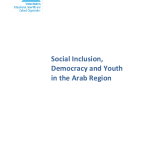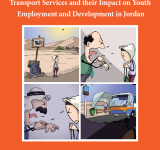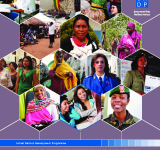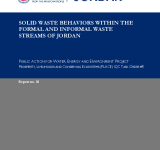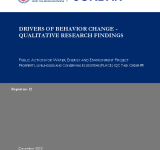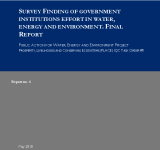public
هدفت هذه الدارسة إلى التعرّف على تأثير خدمات النقل العام للشباب في الفئة العمرية 15-24 على خيارات وأنشطة الشباب فيما يخص التدريب والتشغيل وأهم المشكلات التي تواجه الشباب عند استخدام وسائل النقل
كتبت هذه الدراسة كجزء من المرحلة الأولى من مبادرة برنامج الأمم المتحدة الإنمائي العالمية عبر الممارسة وعبر المواضيعية بشأن المساواة بين الجنسين في الإدارة العامة، والذي أطلق في عام 211. هذا التقرير
The report studies the formal and informal waste streams in Jordan as well as the public behaviors and attitudes that influence them. The study gives a specific emphasis to discovering the “drivers” of these practices as well as barriers to change and aims to locate examples of model behavior that already exists in Jordan so that they can be encouraged and duplicated. It investigates and assesses the four areas – the general attitudes of the Jordanian population towards waste and waste disposal;; informal waste reclamation sector in Jordan;; stream of recyclable material and the formal sanitation and waste management system of Amman and Aqaba. This research was conducted as part of the Public Action for Water;; Energy and Environment Project (PAP);; which aims to encourage water and energy conservation and to support behavior change towards more conservation and efficient practices both at the household level and in the commercial;; industrial and civil society arenas using social marketing behavioral methods. The study finds that there were high levels of awareness and concern about issues such as littering and recycling but it also concludes that the lack of concern amongst the broader public was cited as one principal reasons that people were not taking action. It calls for a quantitative research to confirm Jordanian attitudes on environmental issues.
This report addressed CEDAW Committee by providing a solid and up-to-date information set and analysis of positive policies and legislation taken for women’s advancement and weaknesses that are delaying progress and sustaining disparities. The report covers six components: 1. Jordan’s reservations on CEDAW;; 2. Harmonization of CEDAW into legislation;; 3. Political representation;; 4. Violent against women;; 5. Equal rights in the family;; 6. Conditions of vulnerable and marginalized women. It also provides an overall assessment of the six components covering 3 areas: assessment of the official efforts towards the implementation of CEDAW;; also;; assessment of the civil society efforts and strategies towards monitoring Jordan’s commitment to obligations;; and suggested recommendations for the new concluding observations.
وجه هذا التقرير إلى لجنة سيداو من أجل توفير أحد المعلومات وأكثرها دقة;; بالإضافة إلى دراسة وتحليل السياسات الإيجابية والتشريعات المتخذة في سبيل تقدم ونهوض المرأة وإيجاد مواطن الضعف التي تعمل على تأخير التطور;; وتساه مفي تعزيز التفاوت وعدم المساواة. ويتكون التقرير من ستة مكونات رئيسية: 1. تحفظات الأردن على اتفاقية سيداو;; 2. مواءمة اتفاقية سيداو مع التشريعات الوطنية;; 3. التمثيل السياسي للنساء;; 4. العنف ضد النساء;; 5. الحقوق المتساوية للنساء في العائلة;; 6. أوضاع النساء الضعيفات والمهمشات. ويوفر التقرير تقييماً شاملا للمكونات الستة وذلك من خلال تقييم الجهود الرسمية في سبيل تطبيق اتفاقية سيداو;; وتقييم جهود المجتمع المدني تجاه رصد مراقبة التزام الأردن بالمواثيق الدولية;; إلى جانب تقديم توصيات مقترحة للملاحظات الختامية الجديدة.
The report aims to understand the outlook of Jordanians;; the key determinants of behavioral change in search for “drivers” that can be used in programs promoting conservation of water or energy and reduction of solid waste. This research was conducted as part of the Public Action for Water;; Energy and Environment Project (PAP);; which aims to encourage water and energy conservation and to support behavior change towards more conservation and efficient practices both at the household level and in the commercial;; industrial and civil society arenas using social marketing behavioral methods. It is based on the qualitative research that focuses on identifying people’s motivations;; needs and desires to help formulating social marketing programs and developing adaptive capacity in individuals and groups. Some of the key questions of the qualitative research include “What are the current coping behaviors and attitudes (psychological;; social;; etc …) of the Jordanian public (disaggregated by gender;; age;; geography and income) in the face of limited water availability and high prices for energy?;; What anticipated consequences may the Government face if stricter scenarios were imposed on water and energy? The report recommends the Ministry of Education to cooperate and introduce regular classes that focus on showing youth the direct impact of water;; energy and environment on their lives and raise awareness and consciousness of children regarding their role in the environment and influence it in a positive way.
The report presents the findings of the government institutions efforts survey;; which is designed for the purpose of reviewing the government agencies’ current and past communication activities in water;; energy and environment. The specific objective of this survey is to review the Donor Position Paper on Outreach targeted sample of 36 staff from 22 government institutions from Aqaba and Karak. As part of the Public Action for Water;; Energy and Environment Project (PAP);; a public education and behavior change communication program developed to support USAID’s technical and policy investments in the Jordanian water and energy sectors;; this report finds that many government institutions have more than one role;; overseeing solid waste management;; industrial water and reuse and environmental laws. The report also finds that the communications programs are scattered and credibility and trust between service agencies and their clients is a concern. The interview analysis suggests that the Public Action Project needs to focus on two or three specific areas;; and the report recommends all capacity building activities to be focused on one goal of developing;; implementing and measuring national communication strategies and action plans.
